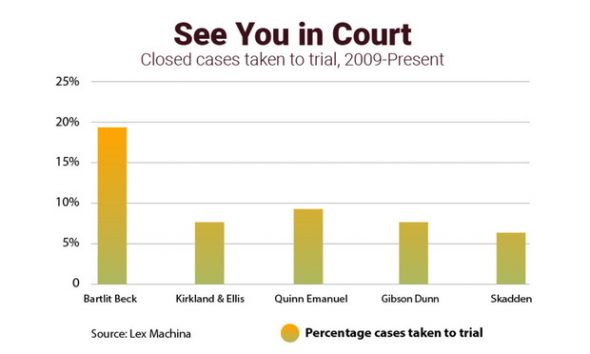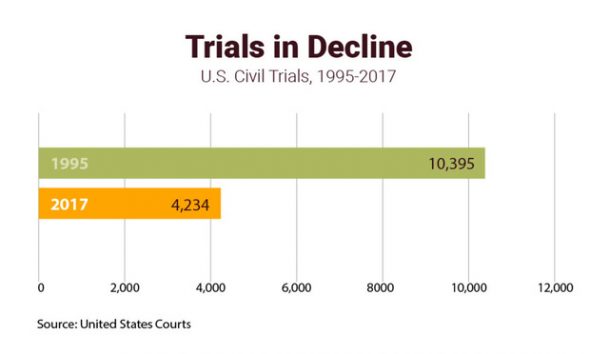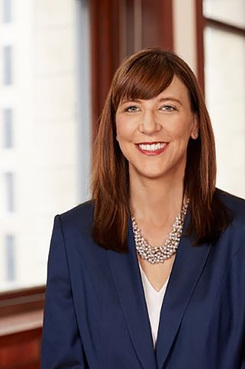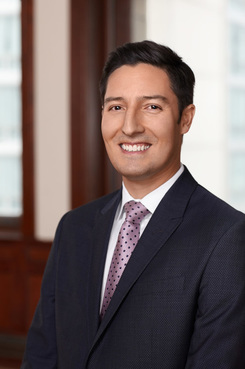At 25, Litigation Boutique Bartlit Beck Is Still on Trial. Is Its Model Winning?
An 80-lawyer trial boutique may have lessons to teach Big Law about developing talent.
December 06, 2018 at 03:54 PM
9 minute read
The original version of this story was published on The American Lawyer
 Bartlit Beck's renovated offices in Chicago. (Credit: Garrett Rowland | Design by Gensler)
Bartlit Beck's renovated offices in Chicago. (Credit: Garrett Rowland | Design by Gensler)
- For a quarter-century, national litigation boutique Bartlit Beck has made its name in a declining business: trials.
- The firm's talent model may provide insights for a lower-leveraged Big Law market.
This fall Bartlit Beck moved into renovated office space in Chicago, complete with all the modern touches: Windows where walls used to be, maximalist video screens and a minimalist mock court that the firm says is what digital-first courtrooms of the future will look like.
The renovation coincided with the anniversary of Bartlit Beck's founding 25 years ago, when a group of trial lawyers broke away firm from Kirkland & Ellis—which, not for nothing, now houses more than 600 attorneys just down the street. For all the office's new-fangled features, the space still honors the history of the building that houses it: Chicago's original criminal courthouse, constructed in 1893. Conference rooms are named after high-profile trials that occurred here, such as the infamous Black Sox scandal following the rigged 1919 World Series. An old-fashioned safe where court files were stored is still intact.
The modern space in an old building is fitting for a young law firm that is, in many ways, a throwback to an earlier time. Bartlit Beck has become one of the country's best-known brands for courtroom advocacy thanks to a model that cherishes one-on-one mentorship, demands teamwork and envisions a partnership track for every lawyer at the firm.
And in an age of ever-declining trials, Bartlit Beck still goes to the finish line on a higher percentage of cases than almost any law firm in the country. From 2009 through late 2018, the firm went to trial in nearly 20 percent of its completed cases in five major types of litigation, according to data from Lex Machina. That compares to a range of 7 to 9 percent for four of the nation's best-known Big Law trial firms: Kirkland & Ellis, Quinn Emanuel Urquhart & Sullivan, Gibson, Dunn & Crutcher and Skadden, Arps, Slate Meagher & Flom.  There are a number of reasons why Bartlit Beck goes to trial so often. The simplest one is that they win. Jason Peltz, the second managing partner in the firm's history, who gained the title earlier this year, said the firm has historically won about 85 percent of its cases that go to verdict.
There are a number of reasons why Bartlit Beck goes to trial so often. The simplest one is that they win. Jason Peltz, the second managing partner in the firm's history, who gained the title earlier this year, said the firm has historically won about 85 percent of its cases that go to verdict.
The firm has to know its track record, since a portion of its fees in virtually every case is paid only if the firm is successful. As Bartlit Beck looks toward its next 25 years, leaders say they have no plan to change that model, and they are most focused on attracting the next generation of top trial lawyers. Its hiring is vastly different from the standard Big Law approach. Roughly 80 percent of the firm's lawyers are partners (67 partners, 15 associates and 2 special counsel are listed on its website), and it adds only one to two new associates a year.
Many expect large law firms will struggle to maintain their traditionally high leverage models as technology makes the practice of law more efficient—and as clients become increasingly reluctant to pay high billable rates to train inexperienced lawyers. In that scenario, bigger firms could look to incorporate aspects of Bartlit Beck's talent and training model.
They could start with a simple question: When a firm expects every lawyer to become a partner, what does it mean to be an associate?
Business Is Good
Fred Bartlit left Kirkland & Ellis in 1993, after 33 years at the firm, taking 18 lawyers with him, including fellow name partner Phil Beck. Bartlit and Beck left following a dispute over the merits of alternative and success-based fees. With a belief that the billable hour only fueled inefficiency, Bartlit in a 1995 American Lawyer article evangelized the rise of success-based payments and predicted a proliferation of firms like his. That revolution remains to be seen. The New York Times is still running op-eds decrying “The Tyranny of the Billable Hour.”
However he planned to get paid, Bartlit didn't necessarily pick the ideal climate to grow a trial firm. The number of civil trials in U.S. federal courts has been more than cut in half since the firm has been in business. In 2017, there were 4,234 such trials, compared to 10,395 in 1995.
 Still, the firm has made a good business out of going to court, even if it declines to discuss compensation or profitability figures. Its reputation remains burnished by the work Bartlit and Beck did to help George W. Bush win a contested Florida election in 2000, with Time Magazine calling Beck “Bush's new star” for his work cross-examining a Democratic voting machine expert. In more recent years, it has worked on behalf of major clients including Citadel, DuPont, United Technologies, Nicor Inc. and Bissell Corp.
Still, the firm has made a good business out of going to court, even if it declines to discuss compensation or profitability figures. Its reputation remains burnished by the work Bartlit and Beck did to help George W. Bush win a contested Florida election in 2000, with Time Magazine calling Beck “Bush's new star” for his work cross-examining a Democratic voting machine expert. In more recent years, it has worked on behalf of major clients including Citadel, DuPont, United Technologies, Nicor Inc. and Bissell Corp.
 Jason Peltz
Jason PeltzBartlit Beck this year was selected among a group of nine top litigation firms by BTI Consulting Inc., joining a list that included Gibson Dunn, Kirkland & Ellis, Quinn Emanuel and Skadden (the top four) and Jones Day, Sidley Austin, Wachtell, Lipton, Rosen & Katz and Winston & Strawn.
Peltz, the managing partner, says clients often select Bartlit Beck to send a message to their opponent in litigation. That reputation is also part of why the firm goes to trial more frequently than other firms, but Peltz said it also can lead to better settlements.
“It absolutely sends a signal to the other side that this case will be ready for trial,” Peltz said. “We want to send that signal. Because sometimes when the case is most ready for trial, that's when you can get the best settlement.”
No Secret Sauce
According to Peltz, the firm works on every matter from the start as if it will be proceeding all the way to trial. That's why lawyers with first-hand trial experience are so valuable, and why Bartlit Beck does all it can to fast-track its young lawyers' development. Associates can't prepare a case as if it's going to trial if they don't know what a trial entails.
Bartlit Beck also staffs cases differently than other firms. It works in smaller teams composed of more experienced lawyers compared to most large firms. The average lawyer at the firm has been practicing for 16 years. It also doesn't typically hire lateral partners.
 Rebecca Weinstein Bacon
Rebecca Weinstein Bacon“People ask me all the time, 'What's your specialty?'” Peltz said. “Our specialty is making complicated matters simple. Our specialty is presenting a client's case in a very credible, simple, real way to juries across the country. And in doing so, being the teacher to juries along with the judge and ourselves—because we're all learning all the time.”
Lawyer development remains a core component of the firm's model. Thirty percent of Bartlit Beck lawyers have first-chair trial experience, the firm says. Last year, 64 percent of its lawyers appeared in court on a substantive issue; 72 percent took defended a deposition; and 57 percent held a substantive role on a trial team.
“Every member of the firm that we work with, from the newest associate to Phil Beck, works closely with our in-house team on all aspects of our cases and makes valuable contributions,” said Shawn Fagan, chief legal officer at Citadel. “They are collaborative, creative, and deliver results for Citadel.”
Recruiting for Emotional Intelligence
Nico Martinez is an example of the kind of candidate the firm attracts. A 2013 Stanford Law graduate and a 2005 College Jeopardy champion, Martinez joined in 2016 following three years as a clerk, first for a federal appeals judge, then a U.S. district court judge and finally a California Supreme Court justice.
 Nico Martinez
Nico Martinez“I knew Bartlit Beck was extremely selective in its hiring, and so I think just to get an interview in some ways felt like an achievement,” Martinez said.
Martinez said on his first day at the firm, he showed up in the Chicago office, signed some employment-related forms and flew with a trial team to meet a client in New York City. They were preparing for a trial scheduled in just a few months.
The firm's associate pool also benefits from the firm's rejection of the billable hour and its belief that every lawyer it hires has the potential to make partner. Martinez said that means associates don't view each other as competition and they often help each other. For instance, when Wesley Morrissette, a 2014 graduate of Northwestern University Pritzker School of Law, was tabbed to give an oral argument in the U.S. Court of Appeals for the Seventh Circuit this year, a group of about five associates helped him prepare, Martinez said.
“If somebody gets to stand up in court in a high-profile case and cross-examine a witness a couple weeks after joining the firm, that's a huge benefit to the firm overall and to me, because I know these are people I'm going to be able to work with for many years,” Martinez said.
As for what Bartlit Beck looks for in its associates, Rebecca Weinstein Bacon, a partner, said it's about emotional intelligence as well as brains and credentials. Much of the interview process is a sort of personality test designed to answer one question: Does the person seem presentable in front of judges and juries?
“We're looking for high EQ,” Bacon said. “And I think we can tell when somebody has high EQ and when they don't.”
Either way, it won't be long before Bartlit Beck takes another case to trial, and another jury weighs in.
This content has been archived. It is available through our partners, LexisNexis® and Bloomberg Law.
To view this content, please continue to their sites.
Not a Lexis Subscriber?
Subscribe Now
Not a Bloomberg Law Subscriber?
Subscribe Now
NOT FOR REPRINT
© 2025 ALM Global, LLC, All Rights Reserved. Request academic re-use from www.copyright.com. All other uses, submit a request to [email protected]. For more information visit Asset & Logo Licensing.
You Might Like
View All
With DEI Rollbacks, Employment Lawyers See Potential For Targeting Corporate Commitment to Equality
7 minute read
Shareholder Democracy? The Chatter Elon Musk’s Tesla Pay Case Is Spurring Between Lawyers and Clients
6 minute read
In-House Lawyers Are Focused on Employment and Cybersecurity Disputes, But Looking Out for Conflict Over AI

2024 Marked Growth On Top of Growth for Law Firm Litigation Practices. Is a Cooldown in the Offing for 2025?
Trending Stories
- 1New York-Based Skadden Team Joins White & Case Group in Mexico City for Citigroup Demerger
- 2No Two Wildfires Alike: Lawyers Take Different Legal Strategies in California
- 3Poop-Themed Dog Toy OK as Parody, but Still Tarnished Jack Daniel’s Brand, Court Says
- 4Meet the New President of NY's Association of Trial Court Jurists
- 5Lawyers' Phones Are Ringing: What Should Employers Do If ICE Raids Their Business?
Who Got The Work
J. Brugh Lower of Gibbons has entered an appearance for industrial equipment supplier Devco Corporation in a pending trademark infringement lawsuit. The suit, accusing the defendant of selling knock-off Graco products, was filed Dec. 18 in New Jersey District Court by Rivkin Radler on behalf of Graco Inc. and Graco Minnesota. The case, assigned to U.S. District Judge Zahid N. Quraishi, is 3:24-cv-11294, Graco Inc. et al v. Devco Corporation.
Who Got The Work
Rebecca Maller-Stein and Kent A. Yalowitz of Arnold & Porter Kaye Scholer have entered their appearances for Hanaco Venture Capital and its executives, Lior Prosor and David Frankel, in a pending securities lawsuit. The action, filed on Dec. 24 in New York Southern District Court by Zell, Aron & Co. on behalf of Goldeneye Advisors, accuses the defendants of negligently and fraudulently managing the plaintiff's $1 million investment. The case, assigned to U.S. District Judge Vernon S. Broderick, is 1:24-cv-09918, Goldeneye Advisors, LLC v. Hanaco Venture Capital, Ltd. et al.
Who Got The Work
Attorneys from A&O Shearman has stepped in as defense counsel for Toronto-Dominion Bank and other defendants in a pending securities class action. The suit, filed Dec. 11 in New York Southern District Court by Bleichmar Fonti & Auld, accuses the defendants of concealing the bank's 'pervasive' deficiencies in regards to its compliance with the Bank Secrecy Act and the quality of its anti-money laundering controls. The case, assigned to U.S. District Judge Arun Subramanian, is 1:24-cv-09445, Gonzalez v. The Toronto-Dominion Bank et al.
Who Got The Work
Crown Castle International, a Pennsylvania company providing shared communications infrastructure, has turned to Luke D. Wolf of Gordon Rees Scully Mansukhani to fend off a pending breach-of-contract lawsuit. The court action, filed Nov. 25 in Michigan Eastern District Court by Hooper Hathaway PC on behalf of The Town Residences LLC, accuses Crown Castle of failing to transfer approximately $30,000 in utility payments from T-Mobile in breach of a roof-top lease and assignment agreement. The case, assigned to U.S. District Judge Susan K. Declercq, is 2:24-cv-13131, The Town Residences LLC v. T-Mobile US, Inc. et al.
Who Got The Work
Wilfred P. Coronato and Daniel M. Schwartz of McCarter & English have stepped in as defense counsel to Electrolux Home Products Inc. in a pending product liability lawsuit. The court action, filed Nov. 26 in New York Eastern District Court by Poulos Lopiccolo PC and Nagel Rice LLP on behalf of David Stern, alleges that the defendant's refrigerators’ drawers and shelving repeatedly break and fall apart within months after purchase. The case, assigned to U.S. District Judge Joan M. Azrack, is 2:24-cv-08204, Stern v. Electrolux Home Products, Inc.
Featured Firms
Law Offices of Gary Martin Hays & Associates, P.C.
(470) 294-1674
Law Offices of Mark E. Salomone
(857) 444-6468
Smith & Hassler
(713) 739-1250






